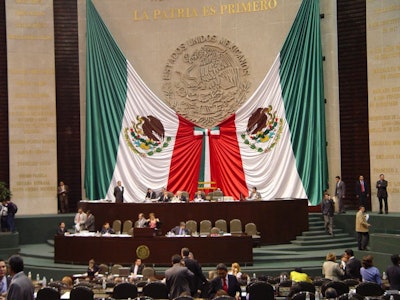
Mexico has been considering introducing animal welfare legislation for several years and, now, two different proposals are being scrutinized by the country’s legislature. While one appears to be somewhat aligned with the needs of the poultry industry and the demands of non-governmental organizations, the other has the potential to cause significant harm to the broiler and egg sectors and the birds they keep.
The proposal causing most concern has come from Sen. Ricardo Monreal, and would appear to be politically motivated, lacking clarity or a scientific basis. Monreal, who has presidential ambitions, may be attempting to garner support from younger generations with his proposal, rather than having fully taken on scientific opinion.
While several aspects of the proposed legislation are worrying and would come into effect 180 days after publication in Mexico’s Official Gazette if approved, the most direct and immediate impacts for the Mexican industry would appear to be in the following areas.
Where the laying industry is concerned, battery and enriched cages would be completely banned. In a country with 168 million hens – the largest flock in Latin America – this would be no easy task.
Removing cages would, in turn, necessitate additional changes for egg producers as there need to investment in new infrastructure, as well as changes in genetics and diets, among other areas.
Beak trimming, including infrared treatments, would be banned.
Where broiler production is concerned, the European model of 39 kg/m2 would be adopted. Without a gradual shift to lower stocking densities, this could cause significant issues in the supply of poultry meat.
Further issues
According to Dr. Elein Hernández, research professor with The National University of Mexico (UNAM) and a member of the scientific committee of Mexico’s national poultry science association, those drafting the proposals had a lack of knowledge where working with birds is concerned, and the main focus has been on cattle and pigs.

According to Dr. Elein Hernández, animal welfare is a science that should support the industry and the broader interests of society and not be focused on the interests of certain groups. (Courtesy UNAM)
For example, under the proposals, tying animals by the legs and turning them would be outlawed. The issue that such a ban raises for poultry is that holding broilers by the legs and turning them is standard practice during harvesting, while hanging them from shackles is necessary for water bath stunning.
Where animal transport is concerned, there would be a requirement that dividers are placed in trucks. While pigs may already benefit from dividers during transport, there would be no benefit for layers or broilers.
Hernández particularly takes issue with lack of clarity in the proposed texts. She points to the frequent use of the word “dignity,” raising the question of how dignity can be measured.
While the proposal refers to the Five Freedoms of animal welfare, it also focuses on positive states of welfare.
Hernández says: “To only talk about positive states is enormously limiting – how can they be measured and regulated?”
She continues that the science has focused more on negative states, as these are more practical to identify and correct, for example when an animal is in pain, diseased or depressed. Still, ongoing scientific work is being developed on positive states assessment. She further points out that welfare cannot be limited to simple checklist, i.e. whether certain conditions are being met.
“We can address the need for freedom from hunger and thirst, but what happens with birds when feed has to be restricted to prevent problems with ascites?” she asks.
Hernández also highlights ethical dilemmas in animal production.
“What happens when, by giving birds the freedom to express natural behaviors, they harm each other through, for example, pecking or cannibalism? Is this right from an ethical viewpoint?”
Religious slaughter also appears to have been poorly considered. The proposal would ban slaughter in accordance with certain religious practices and this would be against the right to freedom of religion enshrined in the Mexican constitution. While religious slaughter has long been a controversial issue, other countries have been able to resolve this through strict regulation.
Who contributed?
While poultry producers were consulted in drawing up the proposals through the industry association the Consejo Nacional de Agropecuaria, the direct participation of animal welfare groups has caused significant concern.
With their lack of expertise in animal welfare or health, they have had greater direct and active participation with representatives at national level than highly experienced professionals were afforded.
Many of the country’s veterinarians have complained that they were not consulted in drafting the proposals.
The federation of veterinary colleges and associations (FedMVZ) has subsequently been in contact with Monreal to express its views and offer scientific input. However, not all veterinarians have been quite so conciliatory, with some independents organizing public protests.
Of additional concern is that the government wants to see the legislation put before a citizens’ council, which will be able to make further recommendations, further increasing the input of non-experts.
Once new a law is approved, being federal, it will be applicable nationwide and legislation will need to be applied within three months of publication in the Official Journal. Without thorough scientific input and consideration, the new law could cause significant issues for Mexico’s animal protein producers and the animals they care for.


















